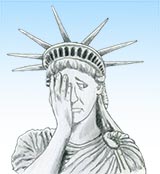
And I just wanted to help...
Why, Oh Why?
It baffles many Americans to hear, and sometimes to experience, that people in other countries dislike them. After all, they sacrifice their blood and treasure to right things, and introduce the principles of individual freedom, in awkward places around the world. Needless to say, when dislike mutates to actual terrorist attempts, Americans find the perpetrators’ motives simply unfathomable.
From that perspective, it was a fair question which George W. Bush posed after the 9/11 attacks: “Why do they hate us?” Unsurprisingly, quite a bit of research has been done on this question in the aftermath, most of it arriving at the conclusion that the US’s foreign policy elicits the terrorists’ wrath: they can’t stomach the overall political and military dominance of the USA in the international system and its involvement in external conflicts, be it through military aid or interventions.
CESifo researcher Tim Krieger and his colleague Daniel Meierrieks, in their latest CESifo Working Paper, come to a somewhat wider-ranging conclusion. Using data for 149 countries for the period between 1970 and 2007, they present evidence suggesting that anti-American resentment is not only incited by US foreign policy, but also by the rise of capitalism. Importantly, though, this is only true when they consider capitalism as social market-capitalism, in the sense of the economic norms theory.
Social market-capitalism defines capitalism “as a way of life: the extent to which citizens in a society regularly contract with strangers located in a market to obtain goods, services and incomes.” This leads individuals, through the routine of signing contracts with strangers, to develop the habit of trusting strangers and preferring universal rights, impartial law, and liberal democratic government. In other words, conducting economic transactions via markets and contracting produces a specific set of norms and values.
Thus, our researchers’ results suggest that anti-American terrorism has actually anti-market roots. When economies undergo the transition from clientelism to market-capitalism, societal groups that have benefited from the pre-market clientelist-traditionalist order of society (the old elite and their economically vulnerable clientele, traditionalists and the religious) may intentionally target the USA to effectively voice dissent and rollback pro-market developments and punish the 'hegemon' for its perceived role in capitalism, globalisation and the Americanisation of their societies.
Surprisingly, this implies that anti-American terrorism is not rooted in economic liberalisation (i.e., the opening up and deregulation of international goods and capital markets) and thus cannot be curtailed solely by the increased interdependence that accompanies economic globalisation, and by the economic gains induced by trade and financial openness.
Market-capitalist development, however, also has countervailing beneficial effects. Anti-American terrorism is less likely to originate from countries that are similar in market-capitalist terms to the USA. Again, this is consistent with economic norms theory.
Market-capitalist countries have no incentive to produce or promote terrorism directed against the USA as the most important market-capitalist economy. Rather, the USA and other market-capitalist economies share similar interests in promoting international market growth (which benefits all of them) and in the expansion and persistence of liberal-democratic institutions that underpin a global status quo favourable to them.
The double-edged effect of market-capitalist development on anti-American terrorism has important policy implications. The US may become a less likely target of transnational terrorism by (peacefully) subsidizing and propagating the establishment of market-capitalist economies. For instance, pro-market interest groups in clientelist economies may be strengthened through US support for domestic programmes that foster the creation of independent judicial institutions (to allow markets to function properly) and counter corruption (to diminish the influence of the old clientelist elite).
Crucially, however, the disruptive political, economic and cultural effects of the marketisation process cannot be disregarded, as they may very well incite anti-American terrorism. Here, the USA may help to make the transition process as bearable as possible for groups in foreign societies that may develop anti-market resentments. For instance, the USA may help to insulate the economically vulnerable from the most adverse consequences of marketisation by means of sound trade policy and directed development assistance geared at increasing local economic opportunities.
Now, if the US foreign policy can be fine-tuned so as to dampen its negative effects, perhaps taking more account of local sensibilities, the US could more easily achieve both the Pax Americana and more free-market capitalism.
